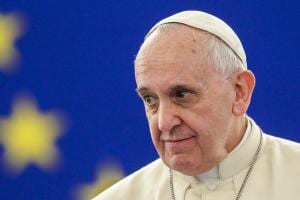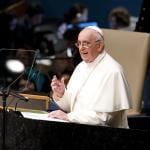Today, Pope Francis released Fratelli Tutti. I read it all today. As I read through I highlighted lines I liked and added them in order to this big file as a kind of mid-sized summary fo the document. Fratelli Tutti was a little harder to summarize than many other papal documents so this ended up about 15% the length of the Encyclical and split into two parts (see part one). I try to provide as much direct quotation as possible to give you a summary that is as unfiltered by my perspective and directly what the Pope wants everyone to hear. I hope you find this helpful.

Chapter Five: A Better Kind of Politics
Summary of the chapter: “The development of a global community of fraternity based on the practice of social friendship on the part of peoples and nations calls for a better kind of politics, one truly at the service of the common good. Sadly, politics today often takes forms that hinder progress towards a different world.” 154
“Nowadays it has become impossible for someone to express a view on any subject without being categorized one way or the other, either to be unfairly discredited or to be praised to the skies.” 155 How often do I see this in Catholic discussion online?
Populism is intrinsically neither good nor bad but it “can degenerate into an unhealthy ‘populism’ when individuals are able to exploit politically a people’s culture, under whatever ideological banner, for their own personal advantage or continuing grip on power. Or when, at other times, they seek popularity by appealing to the basest and most selfish inclinations of certain sectors of the population. This becomes all the more serious when, whether in cruder or more subtle forms, it leads to the usurpation of institutions and laws.” 159
“Employment… is the finest help we can give to the poor, the best path to a life of dignity. Hence my insistence that, ‘helping the poor financially must always be a provisional solution in the face of pressing needs. The broader objective should always be to allow them a dignified life through work.'” 162
“Love of neighbour is concrete and squanders none of the resources needed to bring about historical change that can benefit the poor and disadvantaged. At times, however, leftist ideologies or social doctrines linked to individualistic ways of acting and ineffective procedures affect only a few, while the majority of those left behind remain dependent on the goodwill of others.” 165 Pope Francis critiques selfish people on the left as he critiques selfish people on the right.
Politics should not just work for the powerful. “Everything… depends on our ability to see the need for a change of heart, attitudes and lifestyles. Otherwise, political propaganda, the media and the shapers of public opinion will continue to promote an individualistic and uncritical culture subservient to unregulated economic interests and societal institutions at the service of those who already enjoy too much power.” 166
“The marketplace, by itself, cannot resolve every problem, however much we are asked to believe this dogma of neoliberal faith.” 168 This is not to say that the marketplace cannot solve many problems but that is not a cure-all for societal issues.
Justice means nobody is absolute: “To give to each his own – to cite the classic definition of justice – means that no human individual or group can consider itself absolute, entitled to bypass the dignity and the rights of other individuals or their social groupings.” 171
The international community is similar to a community of persons. “The international community is a juridical community founded on the sovereignty of each member state, without bonds of subordination that deny or limit its independence.” 173
Efficiency or money are means not goals in society. “Politics must not be subject to the economy, nor should the economy be subject to the dictates of an efficiency-driven paradigm of technocracy.” 177
Friendship as a form of charity: “Recognizing that all people are our brothers and sisters, and seeking forms of social friendship that include everyone, is not merely utopian. It demands a decisive commitment to devising effective means to this end. Any effort along these lines becomes a noble exercise of charity.” 180
Imagine if this was how political discussions began: “Charity, with its impulse to universality, is capable of building a new world.” 183
Truth & Charity: “Charity needs the light of the truth that we constantly seek. ‘That light is both the light of reason and the light of faith.'” 185
“Charity, which is the spiritual heart of politics, is always a preferential love shown to those in greatest need; it undergirds everything we do on their behalf. Only a gaze transformed by charity can enable the dignity of others to be recognized and, as a consequence, the poor to be acknowledged and valued in their dignity, respected in their identity and culture, and thus truly integrated into society.” 187
Politicians need to look deeper at real issues, not just popularity. “Their biggest concern should not be about a drop in the polls, but about finding effective solutions to “the phenomenon of social and economic exclusion, with its baneful consequences: human trafficking, the marketing of human organs and tissues, the sexual exploitation of boys and girls, slave labour, including prostitution, the drug and weapons trade, terrorism and international organized crime.” 188
“‘Tons of food are thrown away. This constitutes a genuine scandal. Hunger is criminal; food is an inalienable right.’ Often, as we carry on our semantic or ideological disputes, we allow our brothers and sisters to die of hunger and thirst, without shelter or access to health care.” 189 If you want to read more about rights to food, shelter and medical care, I wrote this.
Chapter Six: Dialogue and Friendship in Society
Arguing online is not dialogue: “Dialogue is often confused with something quite different: the feverish exchange of opinions on social networks, frequently based on media information that is not always reliable. These exchanges are merely parallel monologues. They may attract some attention by their sharp and aggressive tone. But monologues engage no one, and their content is frequently self-serving and contradictory.” 200
Often the media hinders dialogue: “The media’s noisy potpourri of facts and opinions is often an obstacle to dialogue, since it lets everyone cling stubbornly to his or her own ideas, interests and choices, with the excuse that everyone else is wrong.” 201
“Authentic social dialogue involves the ability to respect the other’s point of view and to admit that it may include legitimate convictions and concerns… When individuals or groups are consistent in their thinking, defend their values and convictions, and develop their arguments, this surely benefits society. Yet, this can only occur to the extent that there is genuine dialogue and openness to others.” 203
Truth can be hard to find but is worth the effort: “We need to learn how to unmask the various ways that the truth is manipulated, distorted and concealed in public and private discourse. What we call ‘truth’ is not only the reporting of facts and events, such as we find in the daily papers. It is primarily the search for the solid foundations sustaining our decisions and our laws. This calls for acknowledging that the human mind is capable of transcending immediate concerns and grasping certain truths that are unchanging, as true now as in the past. As it peers into human nature, reason discovers universal values derived from that same nature.” 208
Public ethics should be based on objective moral values: “Acknowledging the existence of certain enduring values, however demanding it may be to discern them, makes for a robust and solid social ethics.” 211
A reminder about natural law at the societal level: “The fact that certain rules are indispensable for the very life of society is a sign that they are good in and of themselves.” 212
We need to open to dialogue not close in on ourselves: “The image of a polyhedron can represent a society where differences coexist, complementing, enriching and reciprocally illuminating one another, even amid disagreements and reservations. Each of us can learn something from others. No one is useless and no one is expendable. This also means finding ways to include those on the peripheries of life.” 215
True peace is difficult: “Social peace demands hard work, craftsmanship. It would be easier to keep freedoms and differences in check with cleverness and a few resources. But such a peace would be superficial and fragile, not the fruit of a culture of encounter that brings enduring stability. Integrating differences is a much more difficult and slow process, yet it is the guarantee of a genuine and lasting peace.” 217
We need to build a covenant between peoples. “Such a covenant also demands the realization that some things may have to be renounced for the common good. No one can possess the whole truth or satisfy his or her every desire, since that pretension would lead to nullifying others by denying their rights. A false notion of tolerance has to give way to a dialogic realism on the part of men and women who remain faithful to their own principles while recognizing that others also have the right to do likewise.” 221
“Kindness frees us from the cruelty that at times infects human relationships, from the anxiety that prevents us from thinking of others, from the frantic flurry of activity that forgets that others also have a right to be happy. Often nowadays we find neither the time nor the energy to stop and be kind to others, to say ‘excuse me,’ ‘pardon me,’ ‘thank you.'” 224
Chapter Seven: Paths of Renewed Encounter
Chapter summary: “There is… a need for peacemakers, men and women prepared to work boldly and creatively to initiate processes of healing and renewed encounter.” 225
“Truth, in fact, is an inseparable companion of justice and mercy. All three together are essential to building peace.” 227
Peace leaves a society with a wide variety of individuals co-existing: “The path to peace does not mean making society blandly uniform, but getting people to work together, side-by-side, in pursuing goals that benefit everyone.” 228
A sense of belonging: “Working to overcome our divisions without losing our identity as individuals presumes that a basic sense of belonging is present in everyone. Indeed, ‘society benefits when each person and social group feels truly at home.'” 230
Peace takes effort to maintain: “There is no end to the building of a country’s social peace; rather, it is ‘an open-ended endeavour, a never-ending task that demands the commitment of everyone and challenges us to work tirelessly to build the unity of the nation.'” 232
“Often, the more vulnerable members of society are the victims of unfair generalizations. If at times the poor and the dispossessed react with attitudes that appear antisocial, we should realize that in many cases those reactions are born of a history of scorn and social exclusion.” 234 Although not mentioned here by name, I think this also applies to how the disabled have been excluded.
How to love our enemies: “We are called to love everyone, without exception; at the same time, loving an oppressor does not mean allowing him to keep oppressing us, or letting him think that what he does is acceptable. On the contrary, true love for an oppressor means seeking ways to make him cease his oppression; it means stripping him of a power that he does not know how to use, and that diminishes his own humanity and that of others. Forgiveness does not entail allowing oppressors to keep trampling on their own dignity and that of others, or letting criminals continue their wrongdoing.” 241
Anger does not lead to justice: “The important thing is not to fuel anger, which is unhealthy for our own soul and the soul of our people, or to become obsessed with taking revenge and destroying the other. No one achieves inner peace or returns to a normal life in that way.” 242
Something to remember about the sacrament of confession: “Reconciliation is a personal act, and no one can impose it upon an entire society, however great the need to foster it.” 246
The relationship between forgiving and forgetting: “Forgiving does not mean forgetting. Or better, in the face of a reality that can in no way be denied, relativized or concealed, forgiveness is still possible. In the face of an action that can never be tolerated, justified or excused, we can still forgive. In the face of something that cannot be forgotten for any reason, we can still forgive. Free and heartfelt forgiveness is something noble, a reflection of God’s own infinite ability to forgive. If forgiveness is gratuitous, then it can be shown even to someone who resists repentance and is unable to beg pardon.” 250
“Justice is properly sought solely out of love of justice itself, out of respect for the victims, as a means of preventing new crimes and protecting the common good, not as an alleged outlet for personal anger. Forgiveness is precisely what enables us to pursue justice without falling into a spiral of revenge or the injustice of forgetting.” 252
The end of this chapter deals with the two most controversial points.
No More War
“War is the negation of all rights and a dramatic assault on the environment. If we want true integral human development for all, we must work tirelessly to avoid war between nations and peoples. To this end, there is a need to ensure the uncontested rule of law and tireless recourse to negotiation, mediation and arbitration.” 257
We should not use false reasoning to justify wars. Criteria for just wars have often been interpreted too broadly. “In recent decades, every single war has been ostensibly ‘justified.’ The Catechism of the Catholic Church speaks of the possibility of legitimate defence by means of military force, which involves demonstrating that certain ‘rigorous conditions of moral legitimacy’ have been met. Yet it is easy to fall into an overly broad interpretation of this potential right. In this way, some would also wrongly justify even ‘preventive’ attacks or acts of war that can hardly avoid entailing ‘evils and disorders graver than the evil to be eliminated.'” 258 This is not a repudiation of just war theory, but a clarification of what bar should be met.
“In view of this [the development of nuclear, chemical and biological weapons], it is very difficult nowadays to invoke the rational criteria elaborated in earlier centuries to speak of the possibility of a ‘just war.’ Never again war!” 259 These lines echo Paul VI speaking to the UN in 1965: “Never again war, never again war! It is peace, peace, that has to guide the destiny of the nations of all mankind!”
“In the words of Saint John XXIII, ‘it no longer makes sense to maintain that war is a fit instrument with which to repair the violation of justice.'” 260 This is a call to redress injustice in other ways.
“Every war leaves our world worse than it was before. War is a failure of politics and of humanity, a shameful capitulation, a stinging defeat before the forces of evil.” 261 This reminds us that part of the definition of a just war is defending oneself and one’s nations from serious evil.
“Rules by themselves will not suffice if we continue to think that the solution to current problems is deterrence through fear or the threat of nuclear, chemical or biological weapons… We need also to ask ourselves how sustainable is a stability based on fear, when it actually increases fear and undermines relationships of trust between peoples. International peace and stability cannot be based on a false sense of security, on the threat of mutual destruction or total annihilation, or on simply maintaining a balance of power.” 262 The Church has called for eliminating nuclear weapons for at least 50 years as it seems very unlikely any of them could be used in a just manner. This is a repetition of the call for mutual (multilateral) disarmament.
The Death Penalty
The basic premise of the section: “St. John Paul II stated clearly and firmly that the death penalty is inadequate from a moral standpoint and no longer necessary from that of penal justice. There can be no stepping back from this position. Today we state clearly that ‘the death penalty is inadmissible’ and the Church is firmly committed to calling for its abolition worldwide.” 263
“There ought to be no exception at all; that it is always unlawful to put a man to death.” -Lactantius (Early Church Father) Pope Nicholas I asked the government “to free from the punishment of death not only each of the innocent, but all the guilty as well.” 265
Punishment should not be vindictive. “Fear and resentment can easily lead to viewing punishment in a vindictive and even cruel way, rather than as part of a process of healing and reintegration into society.” 266
There are always options besides the death penalty. “‘It is impossible to imagine that states today have no other means than capital punishment to protect the lives of other people from the unjust aggressor.’ Particularly serious in this regard are so-called extrajudicial or extralegal executions, which are ‘homicides deliberately committed by certain states and by their agents.'” 267
“All Christians and people of good will are today called to work not only for the abolition of the death penalty, legal or illegal, in all its forms, but also to work for the improvement of prison conditions, out of respect for the human dignity of persons deprived of their freedom. I would link this to life imprisonment… A life sentence is a secret death penalty.” 268 Life sentences should generally be avoided, but this is not saying that they cannot be used in those rare cases that there is no other way to protect society.
Chapter Eight: Religions at the Service of Fraternity in Our World
Summary of the section: “The different religions, based on their respect for each human person as a creature called to be a child of God, contribute significantly to building fraternity and defending justice in society.” 271
True fraternity is based in all being children of the same Father: “As believers, we are convinced that, without an openness to the Father of all, there will be no solid and stable reasons for an appeal to fraternity.” 272
We need to begin from transcendant truth: “If there is no transcendent truth, in obedience to which man achieves his full identity, then there is no sure principle for guaranteeing just relations between people. Their self-interest as a class, group or nation would inevitably set them in opposition to one another. If one does not acknowledge transcendent truth, then the force of power takes over, and each person tends to make full use of the means at his disposal in order to impose his own interests or his own opinion, with no regard for the rights of others.” 273
Religion is not just private: “The Church, while respecting the autonomy of political life, does not restrict her mission to the private sphere. On the contrary, ‘she cannot and must not remain on the sidelines’ in the building of a better world, or fail to ‘reawaken the spiritual energy’ that can contribute to the betterment of society.” 276
Religious ministers should remain active on issues but not partisan: “It is true that religious ministers must not engage in the party politics that are the proper domain of the laity, but neither can they renounce the political dimension of life itself, which involves a constant attention to the common good and a concern for integral human development.” 276
Religious liberty both ways: “We Christians ask that, in those countries where we are a minority, we be guaranteed freedom, even as we ourselves promote that freedom for non-Christians in places where they are a minority. One fundamental human right must not be forgotten in the journey towards fraternity and peace.” 279
“A journey of peace is possible between religions. Its point of departure must be God’s way of seeing things. “God does not see with his eyes, God sees with his heart. And God’s love is the same for everyone, regardless of religion. Even if they are atheists, his love is the same.” 281
Worship bears love not hatred: “Sincere and humble worship of God ‘bears fruit not in discrimination, hatred and violence, but in respect for the sacredness of life, respect for the dignity and freedom of others, and loving commitment to the welfare of all.’ Truly, ‘whoever does not love does not know God, for God is love’ (1 John 4:8).” 283
We should bring peace: “Each one of us is called to be an artisan of peace, by uniting and not dividing, by extinguishing hatred and not holding on to it, by opening paths of dialogue and not by constructing new walls.” 284
Let’s conclude with a prayer Francis quotes in the past paragraph (287):
Lord, Father of our human family,
you created all human beings equal in dignity:
pour forth into our hearts a fraternal spirit
and inspire in us a dream of renewed encounter,
dialogue, justice and peace.
Move us to create healthier societies
and a more dignified world,
a world without hunger, poverty, violence and war.May our hearts be open
to all the peoples and nations of the earth.
May we recognize the goodness and beauty
that you have sown in each of us,
and thus forge bonds of unity, common projects,
and shared dreams. Amen.
That’s all. I hope it helps you.
Back to Part One.
Note: please support me via Patreon to keep making content like this.












